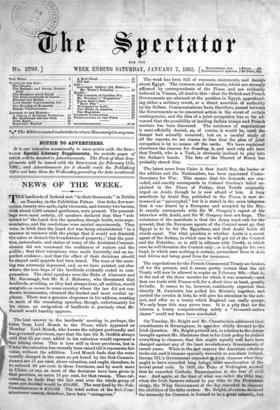On Tuesday, Mr. Bright and Mr. Chamberlain addressed their constituents
at Birmingham, in speeches chiefly devoted to the Irish Question. Mr. Bright pointea out, in relation to the charge brought against Mr. Gladstone that in his Irish policy he yielded everything to clamour, that this might equally well have been charged against any of the least revolutionary Governments of recent years. When in the last century the American rebellion broke out, and it became specially desirable to conciliate Ireland, George [LL's Government conceded to Irish clamour what they ought to have conceded long befor, some amelioration of the brutal penal code. In 1829, the Duke of Wellington avowed that he conceded Catholic Emancipation to the fear of civil war. And again, at the time of what was called the tithe war, when the Irish farmers refused to pay tithe to the Protestant clergy, the Whig Government of the day conceded to olamour the abolition of the tithe system. Mr. Bright, of course, declared the necessity for Coercion in Ireland to be a great calamity, but
he maintainedthat it was as necessary to strike at anarchy, while removing the causes of anarchy, as it is for the captain of a ship in a storm to suppress a mutiny. When the Government were charged with suspending the law in Ireland, he admitted that the charge was true, but he asked by whom and in what interest the law in Ireland was first suspended,—not by the Government and in the interest of order, but by the revolutionary party, one of whom had boasted in Parliament that the ordinary law and ordinary Government had been "knocked into a cocked hat." He showed, by quoting the speeches delivered in the United States by Mr. T. P. O'Connor, M.P., and by Father Sheehy, that the avowed motive of the agitators is not love of the tenantry of Ireland, but hatred of the Union with England, and he insisted with great force on the discreditable character of the attempt to stimulate this hatred, at a time when England is showing in every way her desire to consult Irish feelings, as well as to redress Irish grievances. Mr. Bright did not make excuses for the Government for accompanying remedial mea- slues with protective measures, but openly vindicated that course, as the wise and manly one.















































 Previous page
Previous page